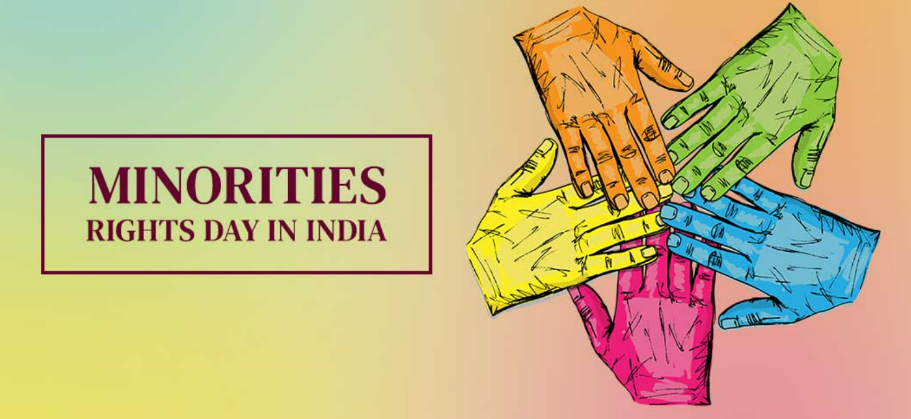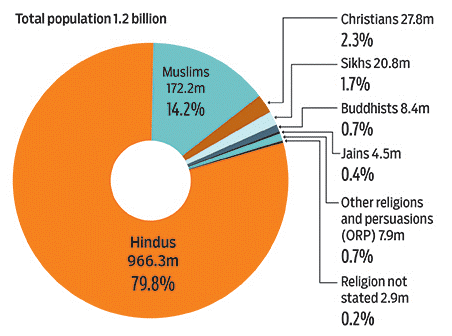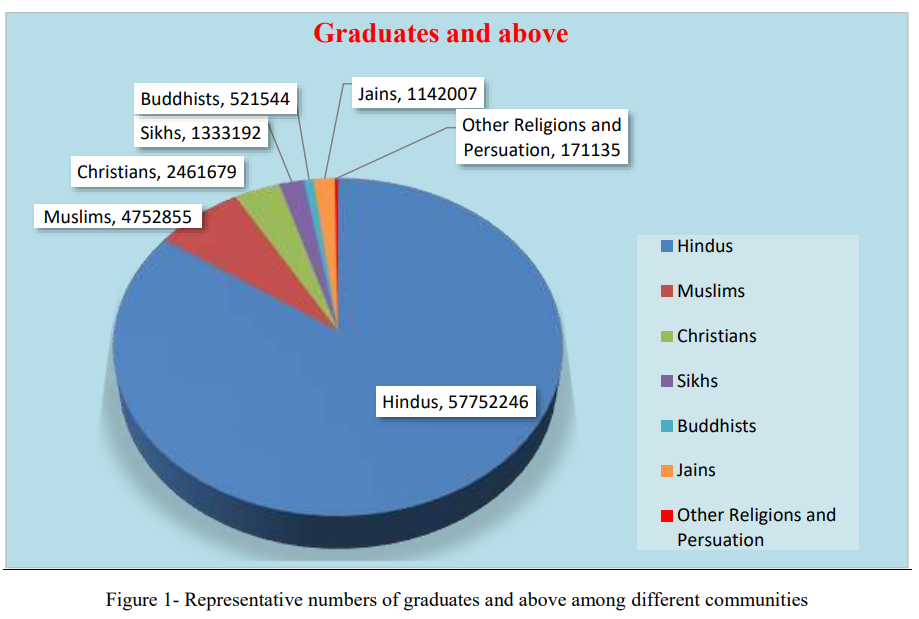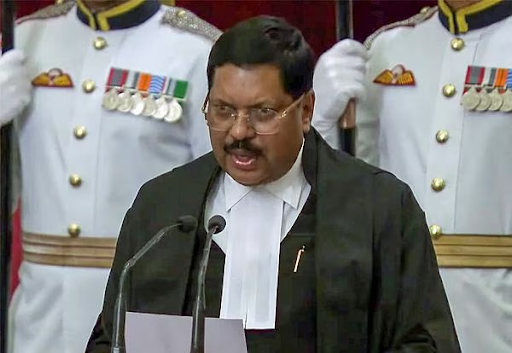
Disclaimer: Copyright infringement not intended.
Context
- Former US president Barack Obama said that India risks "pulling apart" if the Muslim minority is not respected, calling for the issue to be raised with Prime Minister Narendra Modi.
Definition of Minority
- The word “minority” is not defined in the Indian constitution.
- However, the constitution under Article 30(1) refers to minorities as linguistic and religious minorities.
Linguistic Minorities
- Linguistic Minorities are group or collectivises of individuals residing in the territory of India or any part thereof having a distinct language or script of their own.
- The language of the minority group need not be one of the twenty two languages mentioned in the Eighth Schedule of the Constitution.
- In other words, linguistic minorities at the State level mean any group or groups of people whose mother tongues are different from the principal language of the State, and at the district and taluka/tehsil levels, different from the principal language of the district or taluka/ tehsil concerned.
Religious Minorities
- The Union government, under the National Commission on Minorities Act 1992 has recognized 6 minority communities that is Muslims, Christians, Sikhs, Buddhists, Parsis, and Jains. (Jains were added later in 2014).
Constitutional and Legal Provisions related to Minorities
- India, the second most populous country in the world embraces huge number of individuals belonging to different religion, language and culture.
- As per the Census 2011, the percentage of minorities in the country is about 19.3% of the total population of the country.
- The populations of Muslims are 14.2%; Christians 2.3%; Sikhs 1.7%, Buddhists 0.7%, Jain 0.4% and Parsis 0.006%.

- The rights on religious freedom are explicitly expressed in Indian constitution under articles 25- 28.
- It’s not only under the provision of religious freedom but also under the other fundamental rights as well the rights of minorities are interpreted. They are:
ARTICLE 15
- Article 15 (1) prohibits the state from discrimination against any citizen on the grounds of religion, caste, race, place of birth and sex.
- Article 15 (2) states that no citizen shall be subjected to any disability, restriction, or condition regarding the access to shops, public restaurants, hotels and place of public entertainment or the use of wells, tanks, bathing Ghats, roads and places of public resort, maintained wholly or partially out of State funds or dedicated to the use of the general public.
As these sub clauses referred above defines the core meaning of article 15, the article 15 (3), 15(4), 15(5), 15(6) laid down the exemptions provided for 15(1) and 15(2).
- Article 15 (3) states that the State can make special provision for women and children. It is under this provision that courts have upheld the validity of legislation or executive orders discriminating in favour of women.
- Article 15 (4) states that the state can make provisions for the advancements of social and educationally backward citizens, scheduled caste and scheduled tribes.
- Article 15 (5) was inserted in Indian constitution under the 93rd amendment act, 2005 which enables the state to make provisions for the progress of any socially and educationally backward classes of citizens or for the Scheduled Castes or the Scheduled Tribes in so far as such special provisions relate to their admission to educational institutions including private educational institutions, whether aided or unaided by the State, other than the minority educational institutions referred to in clause (1) of article 30.
- Article 15(6) was inserted in the constitution under 103rd amendment act, 2019. It states that nothing in the article or sub-clause (g) of clause (1) of article 19 or clause (2) of article 29 shall prevent the State from making,
- any special provision for the advancement of any economically weaker sections of citizens other than the classes mentioned in clauses (4) and (5); and
- any special provision for the advancement of any economically weaker sections of citizens other than the classes mentioned in clauses (4) and (5) in so far as such special provisions relate to their admission to educational institutions including private educational institutions, whether aided or unaided by the State, other than the minority educational institutions referred to in clause (1) of article 30, which in the case of reservation would be in addition to the existing reservations and subject to a maximum of ten per cent. Of the total seats in each category.
Article 15 prohibits discrimination against any citizens on the basis of caste, sex, religion, place of birth etc. this article was amended by 93rd amendment, 2005 for providing reservations to SC, STs and backward classes in private unaided educational institutions.
ARTICLE 17
- Under this article, untouchability is abolished and practising it in any form is punishable.
- The enforcement of any disability arising out of untouchability shall be an offence punishable in accordance with the law.
ARTICLE 25
- This article refers to the freedom of conscience and free profession, practice, and propagation of religion.
- The sub clause (1) of this article states that: “subject to public order, morality, and health and to other provisions of this part, all persons are equally entitled to freedom of conscience and the right freely to profess, practice ad propagate a religion”.
ARTICLE 26
- The article states about the freedom to manage religious affairs subject to public order, morality and health, every religious denomination or any section thereof shall have the right:
- To establish and maintain institutions for religious and charitable purposes;
- To manage its own affairs on the matters of the religion;
- To own and acquire movable and immovable property;
- To administer such property in accordance with law.
ARTICLE 27
- The article confers on freedom as to payment of taxes for the promotion of any religion. No person shall be compelled to pay any taxes, the proceeds of which are specifically appropriated in the payment of expenses for the promotion or maintenance of any particular religion or religious denomination.
ARTICLE 28
- Under the article it is stated that the freedom as to the attendance at religious instruction or religious worship in certain educational institutions.
- These articles from article 25-28 states about religious rights of every individual who is a citizen of India. But these articles are quite relevant in this era where religious persecutions towards minorities takes place.
ARTICLE 29
- It refers that every citizens residing in any part of the country, belonging to any sections,, having distinct language, script or culture have the right to preserve it.
- Unlike articles 25-28, this article provides protection for both the linguistic and religious minorities. And the word “ sections” used in the article states that the law is also applicable for the majority as well
ARTICLE 30
- This article states that the minorities shall have the right to establish and administer educational institutes of their choice. Unlike article 29, this article is only applicable to linguistic or religious minorities.
ARTICLE 350-B
- This article was inserted for the appointment of special officer for minorities by the president to investigate and carry out activities related to safeguarding the rights of linguistic minorities.
CASE LAWS
- ST. Xavier’s college vs. state of Gujarat: in this case the supreme court had stated that the spirit behind the article 30 (1) is the conscience of nation that the minorities, religious as well as linguistic are not prohibited from establishing and administering educational institutions of their choice for the purpose of giving their children the best general education to make them complete women and men of the country.
- S.P. Mittal vs. Union of India: in this case, the supreme court had stated that:
In order to claim the benefit of article 30(1), the community must show:
-
- That it is religious or linguistic minorities.
- That the institutions are established by it.
- Andhra Pradesh Christian medical association vs. Government of Andhra Pradesh: it was held by the court that the institution in question was not a minority institution. The court classified that the protection of article 30(1) is not available if the institution is a mere cloak or pretension and the real motive is business adventure.
Socio-Economic Problems Faced by Minorities in India
Problems of Prejudice and Discrimination:
- Prejudice against minorities arises as majorities and upper castes see them as outsiders and test their loyalty to their country time and again. \
- They are denied access to a number of basic needs such as education, equal employment, equal wages, and justice.
The problem of Providing Protection
- The need for safety and security is often felt by a minority. Especially in times of community violence, consumer disputes, mass celebrations and religious activities scale, small groups are constantly seeking police protection.
Communal Tensions and Riots
- More than 2,900 cases of religious rioting were registered in the country between 2017 & 2021 – National Crime Records Bureau Data.
Lack of Representation in Politics:
- Minorities are grossly underrepresented among lawmakers.
- Example: The lack of political representation of the largest Muslim community of 14% of the total population, reduces their say in the legislative process of the country resulting in government policies that are nonrepresentative of the minority issues.
- In 2014, Muslim representation, despite being the largest minority, was the least in number. It had only 23 seats which means only approximately 4% representation for a community that constitutes 14% of the population.
- Between 1980 and 2014, the representation of Muslim MPs in the lower house of India’s Parliament has diminished by nearly two-third even as the share of Muslims in the population rose during the same period.
Lack of Representation in Higher Services:
Findings of Gopal Singh Committee
- The employment of Muslims in the government offices, both central and states varied between 5 per cent and 6 per cent of the total employees. Their representation in class I and class II services was between 3 per cent and 4.5 per cent.
- Clearly, the overall representation of Muslims in government services was low compared to their proportion in the population.
Failure to Stay Strictly to Secularism:
- India has declared itself as a “secular” country. The Constitution of our country is secular. Almost all political parties including the Muslim League asserted themselves to be secular. However, in actual practice, no party is honest in its promise to secularism.
- Parties are always waiting for an opportunity to politicize communal issues and take political advantage out of it. Hence, the reliability of these parties in their commitment to secularism is lost.
- This has created suspicion and a feeling of insecurity in the minds of minorities.
Underrepresentation in Higher Education
- According to the recent All India Survey on Higher Education 2018-19 share of enrolled minorities still continue to be under-represented.

Findings of Sachar Committee Report
- In 2005 Prime Minister formed a high-level Committee to assess the social, economic, and educational status of Muslims in India.
- The committee also known as Sachar Committee. The committee published its report in 2006 highlighted the poor socio-economic condition of Muslims in comparison to general population.
- The Sachar Committee report provides details of the Socio-economic and cultural status of Muslims in India.
- It Includes the following:
- 25% Muslim Children in the 6-14 age group have either ever attended school or dropped out.
- Only out of 25 undergraduate and 50 postgraduates are Muslims in premier College.
- Workforce participation among Muslim Women is very Low that is Only 25% which is in compared to Hindu women is very low whose workforce participation is approx. 80%.
- Only about 27% of the Muslims workers in urban area are engaged in regular work as compared to 40% SC/ST, 36% OBC, and 49% Hindu upper caste workers.
- The share of Muslim Male Workers engaged in street wending is 12% as compared to National average of street wending engaged worker is less than 8%.
- The share of Muslim among defence personnel is only 4% which is very low.
Rang Nath Mishra commission On Minorities
- In October 2004 Government of India appointed The Justice rang Nath Mishra Commission for Religious and Linguistic Minorities.
- The commission has presented its report and made many recommendations to the centre for providing reservation to Muslims, Scheduled Caste, and Other backward classes in Government Jobs.
Socio-Economic Facilities for Minorities
Schemes, Programmes, and Initiatives
- The problems of minorities are addressed by the Government through various schemes/programmes/initiatives which are implemented in the state and UTs.
- The schemes/ programmes implemented by this Ministry for the minority communities notified under section 2(c) of the NCM Act 1992 viz Muslims, Christians, Sikhs, Buddhists, Jains and Parsis are as under:-
- Pradhan Mantri Jan Vikas Karyakram (PMJVK) [restructured Multi-sectoral Development Programme (MsDP)] - implemented in identified Minority Concentration Blocks, Minority Concentration Towns, Minority Concentration District Hqs & Clusters of Villages for infrastructure development.
- Pre-Matric Scholarship Scheme, Post-Matric Scholarship Scheme and Merit-cum-Means based Scholarship Scheme – for educational empowerment.
- Maulana Azad National Fellowship – for research fellows empowerment.
- “Naya Savera” Free coaching and Allied Scheme - to enhance skills and knowledge of students and candidates for employment through competitive examination and admission in technical and professional courses.
- Padho Pardes – Scheme for interest subsidy on educational loans for overseas studies in technical and professional courses.
- Nai Udaan - Support for students clearing Preliminary Examination conducted by UPSC, SSC, State Public Service Commission (PSC), etc.
- Jiyo Parsi – Scheme for containing population decline of Parsis.
- Nai Roshni – Scheme for leadership development of minority women.
- Seekho Aur Kamao – Skill development initiative for minorities.
- Nai Manzil – Scheme for formal school education & skilling of school dropouts.
- USTTAD - Upgrading the Skills and Training in Traditional Arts/Crafts for Development.
- Hamari Dharohar - Scheme to preserve rich heritage of minority Communities under the overall concept of Indian Culture.
- Grants-in-Aid to Maulana Azad Education Foundation (MAEF) for implementation of education and skill related schemes.
- Garib Nawaz Skill Development Centre Scheme.
- Equity to National Minorities Development and Finance Corporation (NMDFC) for providing loans at concessional interest rates to minorities for self-employment and income generating activities.
Reservation In Favour of Minority Community
- Reservation is a system of affirmative action by government of India that provides representation to historically backward classes in education, employment, government schemes, health, insurance, scholarships, and politics.
- So that they can represent themselves in society and lives a good life. For the advancement of their life.
In India reservation is provided in:
- Government educational institutions (like NLUs, IITs, IIMs etc) - this is given under article 15(4), (5) and (6
- Government Jobs (like IAS, IPS etc.) this is given under articles 16(4) and (6)
- Legislatures (parliament and State Legislatures) This is given under article 334
- Local government seats reserved for minority communities.
Reservation Quota in India for Minority in Government Jobs
|
OBC
|
SC
|
ST
|
|
|
27
|
15
|
7.5
|
|
Total
|
49.5
|
- So, our governments provide opportunity for our minority to uplift by providing reservation also they not only fight for job in 50 percent but they can also fight in another 50 percent if they get that merit.
- Basically, this reservation not merely for jobs of minority but to take part in decision making process of state.
- The Indian government should do more than reservation for upliftment of minority in real sense.
National Commission for Minorities:
- Under the National Commission for Minorities Act of 1992, the Union Government established the National Commission for Minorities (NCM) to protect and promote the welfare of the 6 religious minorities’ communities.
- Muslims, Christians, Sikhs, Buddhists, Zoroastrians (Parsis) and Jains have been notified as minority communities by the Union Government at the national level.
- The original notification of 1993 was for 5 religious communities; Sikhs, Buddhists, Parsis, Christians and Muslims.
- In 2014, the Jain community was also added.
- As per Census 2001, these six communities consist of 18.8% of the country's population.
- The National Commission for Minorities (NCM) is in line with the United Nations Declaration of 1992 which states that "States shall protect the existence of the National or Ethnic, Cultural, Religious and Linguistic identity of minorities within their respective territories and encourage conditions for the promotion of that identity.”
- Composition
- A Chairperson
- Five members are to be nominated by the Central Government from amongst persons of eminence, ability and integrity. ;
- All the members shall be from minority communities.
Functions and Power of the Commission
- To evaluate the progress of the development of Minorities under the Union and States.
- To monitor the working of the safeguards provided in the Constitution and laws enacted by Parliament and the State Legislatures.
- To make recommendations for the effective implementation of safeguards for the protection of the interests of Minorities by the Central Government or the State Governments.
- To look into specific complaints regarding deprivation of rights and safeguards of the Minorities and take up such matters with the appropriate authorities.
- To conduct studies, research and analysis on the issues relating to the socio-economic and educational development of Minorities.
- Make periodical or special reports to the Central Government on any matter relating to Minorities and in particular the difficulties confronted by them.
- Any other matter which may be referred to by the Central Government.
“No democracy can long survive which does not accept as fundamental to its very existence the recognition of the rights of minorities”.
These lines of sir. Franklin D. Roosevelt clearly portrays the importance of protection of the rights of minorities in a democracy.
Way Ahead
Rang Nath Mishra commission On Minorities:
- The Commission for Minority Educational Institutions set up under the National make it broad based in its composition, powers, functions, and responsibilities. Further it recommended that it should work as the watchdog for enforcement of all aspects of minorities educational rights.
- Establishment of a National-Level Coordination Committee Consisting of representative of all the nationalised banks and other financial institutions to work under the RBI for monitoring credit which is flow to minorities.
- Ten percent of central government jobs should be reserved for Muslims and 5 for other minorities.
- Fifteen Percent of posts in all cadres and grades should be reserved under central government for minorities.
- Ten percent reservations for Muslims and 5 percent for other Minorities should be reserved in all government schemes like the MNREGA etc.
Other Suggestions
- In spite of lot of provisions and schemes there is negligible improvement in the condition of Minority, so government should take care of them more and should form committees which at regular interval check the condition of the minority so they can put more effort. If minority feel that they are not much taken into consideration then this is harmful for country integration and unity and this disrupt the sense of brotherhood.
- They should support institutions that promote minorities education
- The government should Increase the budget for Minorities. In 2021 The budget for minorities Accounts for 0.14% of the total union budget whereas religious minorities population in our country is Approx 21 % of the total populations.
- Government should increase the participation of minority in the legislature so that they can work more for their community because if they are in legislatures in more number then they may pay attention more than the other community legislators.
- Not impose Hindu personal law on Sikh, Buddhist, and Jain communities, but instead provide them with a provision of personal status law as per their distinct religious beliefs and practice.
- Adopt the International Convention on Elimination of All forms of racial Discrimination.
- The right to establish and administer educational Institutions is not absolute so, there can be regulatory measures for ensuring educational character and standards and maintaining academic excellence.
- To provide a sense of security and the feeling of confidence to the minorities by giving them special rights and privileges in a democratic country.
- Regular checks and balances safeguards and guarantees to protect the rights of minorities in terms of cultural and educational rights and others must be done.
- Recommendations from educational institutions that are run by minorities are to be taken to guarantee Article 29 and 30 to the minorities.
Final Thoughts
“No democracy can long survive which does not accept as fundamental to its very existence the recognition of the rights of minorities”.
- The above lines of sir. Franklin D. Roosevelt clearly portrays the importance of protection of the rights of minorities in a democracy.
- In a vast country like India which is made up of diverse cultures, backgrounds, religions, identities etc. it really requires maintaining a sense of equality among its citizen to provide meaning to the term democracy.
- Intolerance can lead India to get collapsed from being a secular country to a communal one.
- Mahatma Gandhi once rightly said that:
“The true measure of any society can be found in how it treats its most vulnerable members”. — Mahatma Gandhi, 1869-1948, Indian leader of independence.
- And India is known to the world by the term “diversity”. It is beautiful when people irrespective of their differences are co-existing.
|
PRACTICE QUESTIONS
Q. Mahatma Gandhi once said that the true measure of any society can be found in how it treats its most vulnerable members. What are the socio-economic problems faced by minorities in India? Delineate the steps taken by the government from time to time to address the issues pertaining to minorities in India. Suggest measures to protect the rights of minorities in a democracy.
|
https://www.dawn.com/news/1761252/obama-warns-india-risks-pulling-apart-without-minority-rights
















